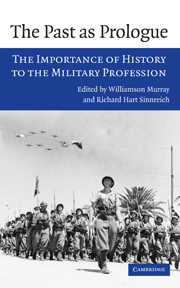Book contents
- Frontmatter
- Contents
- Contributors
- 1 Introduction
- 2 Military history and the history of war
- Part I The influence of history on the military profession
- Part II The past as illuminator of the future
- 7 Thucydides as educator
- 8 Clausewitz, history, and the future strategic world
- 9 History and the nature of strategy
- 10 Military transformation in long periods of peace: the Victorian Royal Navy
- 11 Military history and the pathology of lessons learned: the Russo-Japanese War, a case study
- 12 Obstacles to innovation and readiness: the British Army's experience, 1918–1939
- 13 What history suggests about terrorism and its future
- 14 History and future of civil–military relations: bridging the gaps
- Index
8 - Clausewitz, history, and the future strategic world
Published online by Cambridge University Press: 05 June 2012
- Frontmatter
- Contents
- Contributors
- 1 Introduction
- 2 Military history and the history of war
- Part I The influence of history on the military profession
- Part II The past as illuminator of the future
- 7 Thucydides as educator
- 8 Clausewitz, history, and the future strategic world
- 9 History and the nature of strategy
- 10 Military transformation in long periods of peace: the Victorian Royal Navy
- 11 Military history and the pathology of lessons learned: the Russo-Japanese War, a case study
- 12 Obstacles to innovation and readiness: the British Army's experience, 1918–1939
- 13 What history suggests about terrorism and its future
- 14 History and future of civil–military relations: bridging the gaps
- Index
Summary
If this were a sermon, Carl von Clausewitz's declamation would be its text: “[A]ll wars are things of the same nature.” This is the master claim that provides coherence and unity to the argument that follows in this essay.
Writing in approximately 1818, Clausewitz revealed the ambition and pride common to many authors when he declared that “[i]t was my ambition to write a book that would not be forgotten after two or three years, and that possibly might be picked upon more than once by those who are interested in the subject.” The heart of the matter is that there are two reasons why military leaders and theorists at all levels are unlikely to forget Clausewitz's work. First, he developed, albeit sketchily in some regards, a theory of war that does not depend for its relevance to a particular time, character of belligerent, or technology. Second, his theorizing was manifestly superior to anything similar written before or since. Christopher Bassford has it exactly right when he claims that Clausewitz's “work survives as a living influence because his approach, overall, comes closer to capturing the complex truth about war than any writer since.” In other words, Clausewitz is the best that scholars and soldiers have to help in understanding the nature of war, how it works, and above all, why it works.
- Type
- Chapter
- Information
- The Past as PrologueThe Importance of History to the Military Profession, pp. 111 - 132Publisher: Cambridge University PressPrint publication year: 2006
- 3
- Cited by



